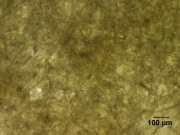Alpha cellulose
Revision as of 07:25, 24 July 2013 by (username removed)
Description
One of three classes of cellulose, alpha cellulose has the highest degree of polymerization and is the most stable. The other two classes, known as hemicelluloses, are beta cellulose and gamma cellulose. Alpha cellulose is the major component of wood and paper pulp. It may be separated from the other components by soaking the pulp in a 17.5% solution of sodium hydroxide. The pure white, alpha cellulose is insoluble and can be filtered from the solution and washed prior to use in the production of paper or cellulosic polymers. A high percent of alpha cellulose in paper will provides a stable, permanent material. Linen and cotton contain high proportions of alpha cellulose.
Authority
- G.S.Brady, Materials Handbook, McGraw-Hill Book Co., New York, 1971 Comment: p. 169
- Matt Roberts, Don Etherington, Bookbinding and the Conservation of Books: a Dictionary of Descriptive Terminology, U.S. Government Printing Office, Washington DC, 1982
- The Dictionary of Paper, American Paper Institute, New York, Fourth Edition, 1980
- E.J.LaBarre, Dictionary and Encyclopedia of Paper and Paper-making, Swets & Zeitlinger, Amsterdam, 1969
- A Glossary of Paper Conservation Terms, Margaret Ellis (ed.), Conservation Center of the Institute of Fine Arts, New York City, 1998
- Roy Perkinson, contributed information, 1998
- Theodore J. Reinhart, 'Glossary of Terms', Engineered Plastics, ASM International, 1988
- Website address 1 Comment: http://www.archivalsuppliers.com/glossary.html
